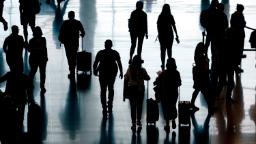
Renting a car — if you can find one — will likely cost you more than years past. And hotel prices are climbing nationwide too. So much for relaxation.
What’s going on?
Your summer travel woes (probably) aren’t your fault. In the sky, airlines have significantly fewer employees, especially pilots, than they did before the pandemic. And on the road, a shortage of available vehicles has pushed rental car prices up double digits.
A lot of this turbulence can be traced back to Covid-19.
It starts with demand. Airlines and hotels are forecasting record travel this summer as Americans who delayed trips during the pandemic return to vacationing.
Demand meets short staffing. Though airlines received $54 billion in federal assistance during Covid’s peak to avoid involuntary layoffs, they have fewer employees after offering buyouts and early retirement packages to trim staff and save money.
Then there’s inflation. The Consumer Price Index, the government’s leading inflation measure, estimates that overall fares were up 37.8% in May compared to the previous year, and up 21.7% compared to May of 2019, before the pandemic.
Remember, in the throes of the outbreak, the Federal Reserve implemented emergency stimulus measures to keep financial markets from tanking. The central bank slashed interest rates to near zero and began pumping tens of billions of dollars every month into the markets by buying up corporate debt.
Rental cars also have a pandemic problem. During the height of the pandemic, the industry sold off more than a half a million cars, about a third of their combined fleets, just to generate cash they needed to survive the crisis. Following a year of deep losses, rental car companies have had trouble rebuilding their fleets to meet demand, resulting in exorbitantly high prices before you even fill up the tank.
Hotels, too. You won’t feel much relief when you reach your destination either. Remember the issue of pent-up travel demand? That’s crashing into a limited number of places to stay and resulting in some eye-popping prices.
What’s the Biden administration doing?
The source said Buttigieg asked CEOs to talk through plans to prevent and respond to disruptions over the July Fourth holiday weekend and beyond.
What are airlines saying?
US airlines want you to know they’re trying. Airlines for America, the group representing major US airlines, told CNN in a statement Thursday that it is making “every effort to help ensure smooth travel this weekend.”
“U.S. airlines are navigating a range of challenges — including weather and staffing at the carrier and federal government level — and making every effort to help ensure smooth travel this weekend and year-round. As always, we are working closely and collaboratively with the federal government to address challenges, including inclement weather, so adjustments to schedules can be made and carriers can communicate with travelers as early as possible,” the statement said.
The group’s airline members are taking different approaches to reducing summer flight disruptions, including cutting the number of flights and allowing passengers to rebook without fees for non-peak periods.
How long will this last?
He writes: In almost every case, the problem is that too many experienced people were let go during the pandemic — either laid off or given a voluntary out — and that airlines, airports, and other key parts of the aviation system have not hired and qualified enough people to replace them.
That qualification point is important. As airlines and airports know all too well, there’s a whole process involved to get someone the kind of security pass that allows them to work on an airplane or at an airport gate.
Put differently, travel is going to be difficult for a while.
How can you prepare?
The earlier the better. Taking a flight that departs early in the day helps to avoid the cascading effect of delays and cancellations. Bad weather is also more likely to affect later flights.
Leave cushion time for can’t-miss events. Don’t travel on the day of an important event such as a wedding. Plan to arrive at least one day early.
Ask for a hotel voucher if your flight is canceled. If you can’t get on a flight the same day, it’s worth asking for meal or hotel vouchers. In many cases, such as weather events, airlines aren’t required to provide them, but it’s worth asking.
Most importantly, stay considerate. Don’t take your frustration out on customer service employees. They aren’t making the operations decisions.
CNN’s Gregory Wallace, Chuck Johnston and Ramishah Maruf, contributed to this report.




